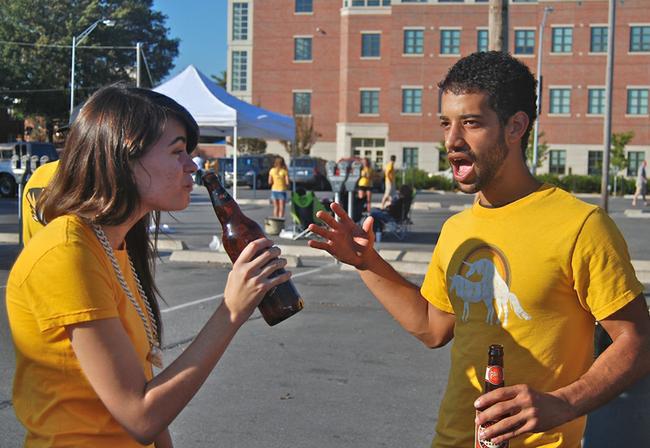To make sporting events safe, alcohol is banned at MU stadiums in accordance with NCAA policy.
With the possibility of MU leaving the Big 12, the alcohol policy could change depending on the conference. The Big 12 conference handbook does not have any rules enforcing the alcohol ban.
The concern for alcohol abuse linked to intercollegiate events is a primary reason for the NCAA policy banning alcohol sales at championships and advertising must also be covered as much as possible throughout the venue.
“We’ve had that rule in place for years,” NCAA spokesman Cameron Schuh said. “NCAA championships are the ultimate experience for our student-athletes, the pinnacle of their career, and we want the entire championship, the events, the venue and all other ancillary things going on, to focus on these student-athletes getting to this point in their careers.”
The institution’s alcohol policies for the regular season and conference tournaments are created by the individual school and their affiliated conference. Some institutions permit the sale of beer at sporting events, but this decision depends on the location of the game, not solely university personnel giving the green light.
“This is really based on if the facility is on university-owned property or off-campus facility, along with many other factors that decision makers need to evaluate before approving such a change,” MU Director of Game Operations Colleen Lamond said.
The Big 12 conference currently does not have any members allowing the sale of beer or alcohol within campus-owned stadiums. MU allows for the consumption of alcohol inside the private suites, the press box and the Tiger Lounge. For those of legal drinking age, tailgating is permitted in designated areas surrounding the stadium and parking lots, according to mizzoutailgating.com.
“Here at Mizzou we only serve alcohol in the football press box, which is a controlled area,” she said. “Although there is no rule preventing schools from selling alcohol at sports events, it is highly recommended from the NCAA as at all NCAA Championships there are no beer sales.”
Instances with alcohol as a major issue at games have yet to arise. This might be due to MU’s ban on alcohol in the stadium and precautionary steps taken to ensure the safety of all who attend MU football games, Schuh said.
“We work with our event staff, specifically our gate bag checkers and ticket takers during their training sessions on how to screen our fans coming into the stadium for not only alcohol but other prohibited items,” Lamond said.
The athletics department disperses pamphlets at the beginning of the year informing students that alcohol is not permitted inside the stadium.
But alcohol consumption prior to entering the stadium during the season’s kick-off game sparked a few alcohol-related issues.
“Sometimes alcohol can lead to people getting sick or they don’t hydrate enough if they’re drinking alcohol,” MU Police Department Capt. Scott Richardson said. “During the first game we had a lot of medical emergencies due to the heat, but that also could’ve been contributed to drinking too much alcohol and not drinking enough fluids to replenish the fluids they’re losing because of the heat.”
MUPD will have officers assigned on each side of the stadium to check for alcohol and banned substances from being brought into the stadium.
“It’s not something that’s new,” Richardson said. “We’ve always done that.”








